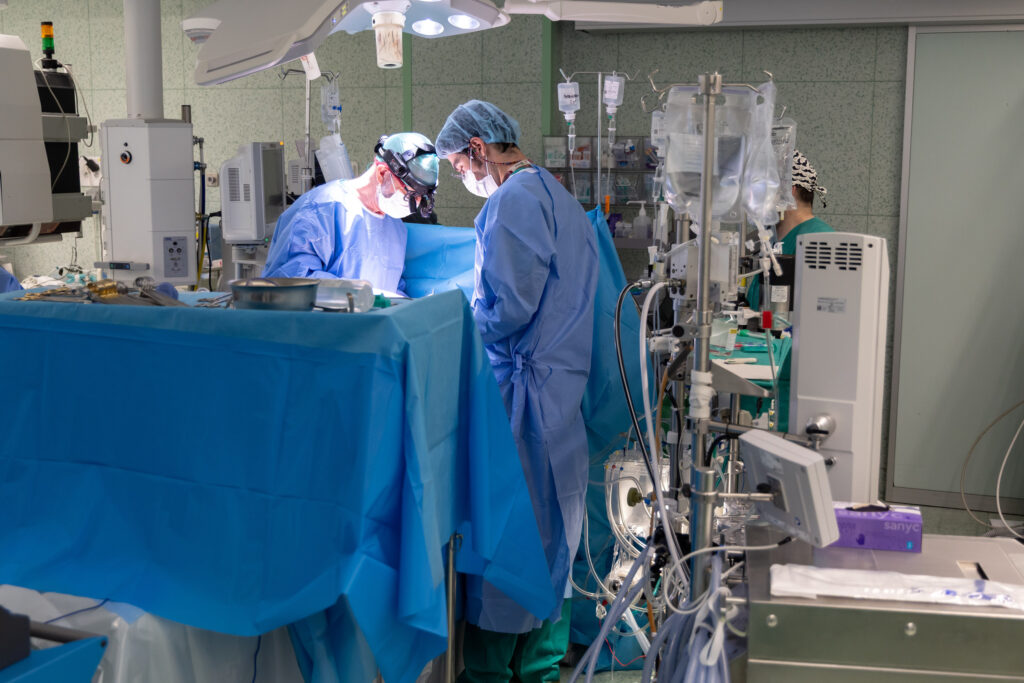Mitral Valve Replacement
What is Mitral Valve Replacement?
Mitral valve replacement is a surgical procedure that involves replacing the heart’s mitral valve when it is damaged or not functioning correctly. This treatment is used to correct problems such as mitral insufficiency (when the valve does not close properly) or mitral stenosis (when the valve is narrowed, hindering blood flow). The goal is to restore normal heart function and improve the patient’s quality of life.
What is this procedure for?
Mitral valve replacement is primarily used for:
- Treatment of valvular diseases: Correcting mitral insufficiency, mitral stenosis, or other conditions affecting the mitral valve.
- Symptom relief: Reducing discomfort such as shortness of breath, fatigue, leg swelling, and palpitations.
- Prevention of complications: Decreasing the risk of heart failure, strokes, and severe arrhythmias.
- Improved quality of life: Restoring normal heart function to allow the patient to perform daily activities without limitations.
Benefits of High Technology in Mitral Valve Replacement
During the procedure, the damaged mitral valve is replaced with an artificial or biological valve. The surgery can be performed using open techniques (sternotomy) or minimally invasive approaches, depending on the patient’s condition and the medical team’s preference.


What does the procedure involve?
The mitral valve replacement procedure involves:
-
Preparation:
For preparation, during the initial consultation, the cardiologist and surgeon will evaluate your medical history and symptoms. You will undergo tests such as echocardiography, electrocardiogram (ECG), computed tomography (CT) scan, or magnetic resonance imaging to plan the surgery. It is advisable to fast for several hours before the intervention. Additionally, be sure to inform your doctor about any medications you are taking, especially anticoagulants.
-
During the procedure:
During the procedure, you will receive general anesthesia so you are completely asleep. The surgeon will make an incision in your chest to access the heart, although in some cases of minimally invasive surgery, small incisions will be used. Then, the damaged mitral valve will be removed and replaced with an artificial valve, which can be mechanical or biological (from animal or human tissue). Throughout the procedure, your heart rate and blood pressure will be monitored to ensure your safety. The surgery usually lasts between 2 and 4 hours.
-
After the procedure:
After surgery, you will be transferred to an intensive care unit, where you will be monitored for the first few hours. You may experience mild discomfort at the incision site or a feeling of tiredness. You will be advised to avoid intense physical activities for the first few weeks to aid your recovery. The cardiologist will evaluate the results and explain the findings and necessary follow-up.
Recommendations for the procedure
It is important to inform the medical team if you have any allergies to medications or materials that will be used during the procedure. Also, be sure to follow all medical instructions before, during, and after surgery to ensure your safety and the effectiveness of the treatment.
Are there any risks?
Mitral valve replacement is a safe procedure, but like any medical intervention, it can have minimal risks:
- Arrhythmias: Some people may develop irregular heart rhythms after surgery.
- Bleeding: At the incision site or within the chest.
- Infection: Although rare, it can occur in the incision area or around the implanted valve.
- Clot formation: There may be a risk of blood clots that could cause a stroke.
- Anesthesia-related risks: Dizziness, nausea, or allergic reactions.
For your procedure to go smoothly, we ask that you arrive in advance of your scheduled time. This will allow us to complete the necessary administrative and clinical preparation.
Before the procedure, we will provide you with the Informed Consent form, a document with important information that you must read and sign.
If your appointment is for a Magnetic Resonance Imaging (MRI), it is crucial that you inform us about the presence of pacemakers, metallic objects, prostheses (including dental ones), tattoos, or medication infusion devices, such as insulin pumps.